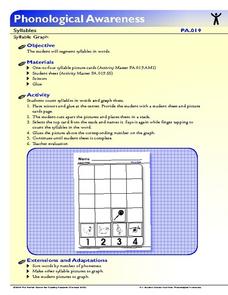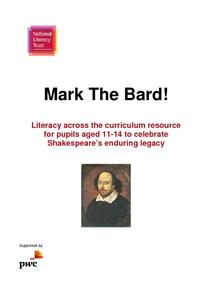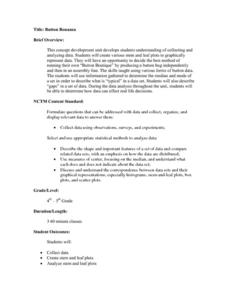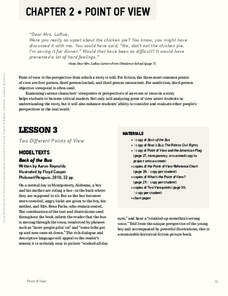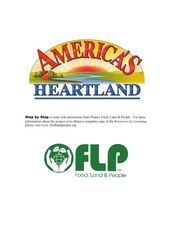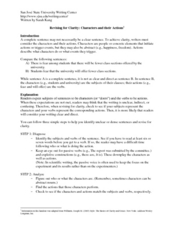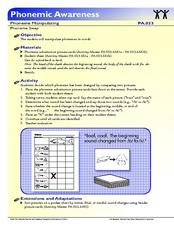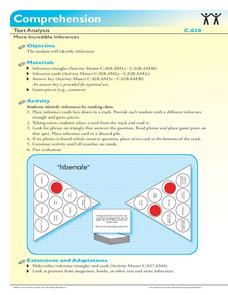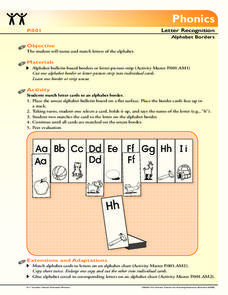Florida Center for Reading Research
Phonological Awareness: Phoneme Isolating, Move and Tell
Build phonological awareness with this fun game focused on isolating and identifying medial phonemes. This game board contains an image on each square; when the child lands on a square, they must say the medial sound of the word they...
Florida Center for Reading Research
Phonological Awareness: Syllables, Syllable Graph
Scholars make a pictograph based on the number of syllables in each picture card. They choose a card, say the name of the object on the card, break the word into syllables, count the syllables, then glue the picture onto the number chart...
National Literacy Trust
Mark The Bard!
Commemorate the 400th anniversary of Shakespeare's death with a packet of cross-curricular literacy lessons and activities centered around two of the Bard's most popular plays, Macbeth and The Tempest. Class members look for...
Curated OER
Pasta Names
Helps learners recognize alphabet letters by having them glue dry pasta over their names. Scholars use a card with their names printed neatly, then decorate it with noodles while saying each letter they make.
Texas State Energy Conservation Office
Investigation: Water Wheel
Middle school scientists construct a working water wheel from an aluminum pie pan. Because of the sharp edges on the cut aluminum, this activity is for mature learners only. You could have your class compete to see whose wheel can lift...
Lerner Publishing
Living or Nonliving
It's alive! Or is it? Through a series of shared readings, whole class activities, and independent exercises children explore the difference between living and non-living things, creating a pair of printable books...
Lawrence Hall of Science
DIY Sun Science
Get an up-close-and personal look at the sun from the safety of your classroom with this fun science application. Offering numerous activities, images, and videos, the resource supports children of all ages as they learn about the sun.
Curated OER
Button Bonanza
Collections of data represented in stem and leaf plots are organized by young statisticians as they embark some math engaging activities.
E Reading Worksheets
Making Predictions #3
Sometimes it's helpful for kids to predict what is coming next when reading a story. Show your learners how to use evidence from the text they are reading to predict what happens next in five short passages.
Scholastic
Point of View
The point of view in a story can dramatically change the story itself. Focus on finding the points of view in various reading passages with a language arts packet, which includes fiction and nonfiction text.
E Reading Worksheets
Making Predictions #1
How can you tell what is going to happen next in a story? Learn to make predictions with five sections of stories. Kids read the beginning, and then write what they believe will happen next. Additionally, they provide evidence for their...
Curated OER
Library Visit 2 Activity
In this literacy worksheet, students look for the words that are related to the concept of using the media center and library. The information is used to write a paper.
Curated OER
Step-By-Step
For many emerging writers, essays are completed step-by-step. With the help of this lesson plan, learners will narrow down a topic, develop a thesis statement, develop a preliminary outline, conduct Internet research, and understand the...
Curated OER
Expression: Masks - Activity 1
Students create art plans for an "installation" after viewing a video of Native American mask making that centers around the Salmon rack idea. Emphasis is placed on collaborative work in this introductory lesson plan.
Curated OER
Guest Speaker Preparation: A Cooperative Lesson
Are you planning to have a guest speaker talk to your class? Prepare in advance and help your class transform into an engaged and thoughtful audience. Before the visit, young writers work cooperatively to brainstorm what they want to...
San José State University
Revising for Clarity: Characters and Their Actions
This handout offers a three-step process for revising sentences for clarity: diagnose, analyze, revise. After reading an example sentence revision with a detailed explanation, learners complete three sample sentences using the three-step...
Florida Center for Reading Research
Phonological Awareness: Rhyme, Rhyme Closed Sort
A rhyming activity challenges scholars to sort picture cards according to their rhyme. Four picture cards line up across the top of a pocket chart. Learners take turns choosing from a face-down stack of picture cards and sort them...
Florida Center for Reading Research
Phonics: Letter-Sound Correspondence, Letter-Sound Folder Sort
Practice letter-sound correspondence using an activity that challenges pupils to sort images based on their final sounds. Pairs choose four final sounds to place in an open file folder, take turns selecting image cards, pronouncing the...
Florida Center for Reading Research
Phonological Awareness: Phoneme Manipulating, Phoneme Swap
Reading readiness can be a fun skill to foster. Scholars manipulate phonemes to change one word into another. They pick picture cards, say the object's name on the card, then change the final phoneme to create a new word. They then find...
Florida Center for Reading Research
Comprehension: Text Analysis, More Incredible Inferences
Reinforce inference skills with a learning game! Scholars read scenarios on cards and match them to a written inference on the triangle. The first pupil to match all their inferences wins!
Florida Center for Reading Research
Phonics: Letter Recognition, Alphabet Borders
Reinforce early reading skills with an activity focusing on letter recognition. Class members work in pairs to match uppercase and lowercase letters of the alphabet.
Texas Center for Learning Disabilities
Second-Grade Comprehension-Based Intervention
Help your youngsters find meaning in the text they read with this series of five intervention lessons. Offering explicit, step-by-step instructions for walking children through shared readings of leveled books, these...
Florida Center for Reading Research
Vocabulary: Morphemic Elements, Rooting for Meaning!
Scholars work with root and meaning cards to build vocabulary skills. Playing with a partner, learners read a root, locate its meaning, and cover it with a counter. The first player to cover their board wins.
Texas Center for Learning Disabilities
Teacher Templates
Letter by letter, sound by sound, monitor the growth of your emergent readers with these assessment templates. Adaptable to the needs of individual students, these one-on-one assessments focus on children's ability to identify...



